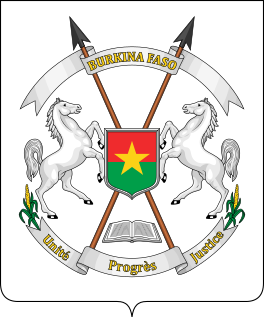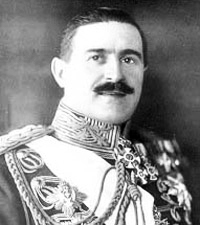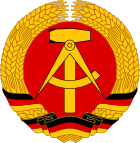
General elections were held in Swaziland on 19 and 20 April 1967. The result was a second successive victory for the royalist Imbokodvo National Movement, which won 79.4% of the vote and all 24 seats.

General elections were held in Rwanda on 10 March 1965, the first direct one in the country and the first since independence in 1962. At the time, the country was a one-party state with MDR-Parmehutu as the sole legal party. Its leader, Grégoire Kayibanda, ran unopposed in the country's first election for President. Voter turnout was 87.6%.

General elections were held in Rwanda on 29 September 1969. At the time, the country was a one-party state with MDR-Parmehutu as the sole legal party. Its leader, Grégoire Kayibanda, ran unopposed in the presidential election. Voter turnout was 90.9%.

Parliamentary elections were held in the Central African Republic on 15 March 1964. The country was a one-party state at the time, with the Movement for the Social Evolution of Black Africa (MESAN) as the sole legal party. As a result, it won all 60 seats in the National Assembly with 98.96% of the vote.

Presidential elections were held for the first time in the Central African Republic on 5 January 1964. In December 1963 the Parliament had formally adopted a constitutional amendment that set the presidential term at seven years. The country was a one-party state at the time, with the Movement for the Social Evolution of Black Africa (MESAN) as the sole legal party. Its leader, incumbent President David Dacko, was the only candidate, and won with 99.97% of the vote and a 93.8% turnout.

Presidential elections were held for the first time in the Republic of Upper Volta on 3 October 1965, as previously the President had been appointed by the National Assembly. At the time, the country was a one-party state, with the Voltaic Democratic Union-African Democratic Rally as the sole legal party. Its leader, Maurice Yaméogo, was the only candidate, and was re-elected with 100% of the vote. Voter turnout was 98.4%.

General elections were held in Liberia in May 1955. For the first time since 1931 there was more than one candidate in the presidential election. However, William Tubman of the True Whig Party was easily re-elected, winning over 99.5% of the vote.

General elections were held in Senegal on 25 February 1968 to elect a President and National Assembly. After a series of party mergers, the country had become a one-party state, with the Senegalese Progressive Union (UPS) as the sole legal party, As a result, its leader, Léopold Sédar Senghor, was the only candidate in the presidential election and was re-elected unopposed. In the National Assembly election, voters were presented with a list of 80 UPS candidates to vote for. Voter turnout was 94.7% in the presidential election and 93.0% in the National Assembly election.

Elections to the French National Assembly were held in French Dahomey on 10 November 1946. The territory elected a single member to the Assembly. Sourou-Migan Apithy was the only candidate, and was elected unopposed. Voter turnout was 59.1%.
Parliamentary elections were held in Egypt on 21 December 1929. The result was a victory for the Wafd Party, which won 198 of the 236 seats, including 102 seats in which their candidates were returned unopposed. Four independents were also returned unopposed.

Parliamentary elections were held in Egypt in March 1942. They were boycotted by the opposition, resulting in the ruling Wafd Party winning 240 of the 264 seats.
General elections were held in Romania in May and June 1926. The Chamber of Deputies was elected on 25 May, whilst the Senate was elected in two stages in May and 10 June. The result was a victory for the governing People's Party, which, together with the allied Romanian National Party–Goldiș, Magyar Party and German Party, won 292 of the 387 seats in the Chamber of Deputies and 107 of the 115 seats in the Senate elected through universal male vote. With some exceptions, the Peasants' Party and the main branch of the National Party ran on common lists under the name of National Peasant Bloc.

Parliamentary elections were held in Yugoslavia on 8 November 1931. Voters were presented with a single list of candidates supporting the royal dictatorship of King Alexander. The list was headed by Prime Minister Petar Živković.

Elections to the National Assembly of France were held in Algeria on 14 October 1877 as part of the wider National Assembly elections. All three seats had only one candidate.

Elections to the French National Assembly was held in the territory of Ivory Coast on 2 June 1946 as part of the wider parliamentary elections. Voting was carried out using separate electoral colleges for citizens and non-citizens. André Schock and Félix Houphouët-Boigny were elected.

Territorial Council elections were held in French Somaliland on 18 November 1963. Ali Aref Bourhan was elected President of the Executive Council following the elections.

Territorial Assembly elections were held in French Cameroons on 30 March 1952.

General Council elections were held in French Cameroons on 22 December 1946.
Elections to the French National Assembly were held in the constituency of French Sudan−Niger on 2 June 1946 as part of the wider parliamentary elections. Two members were elected from two separate electoral colleges. A second round of voting was held in the first colleges on 16 June as no candidate received over 50% of the vote in the first round.

Representative Council elections were held in Gabon in December 1946 and January 1947.


















